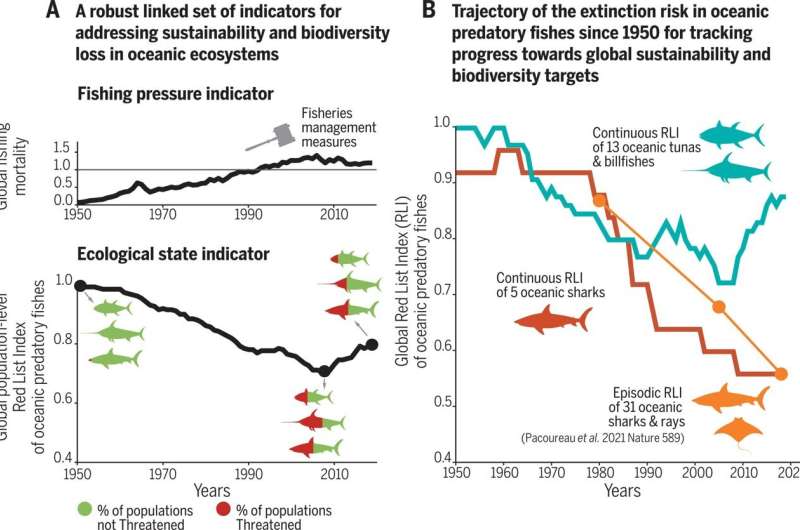November 11, 2022 report
Tuna and billfish are recovering from extinction risk as sharks continue to decline

A team of researchers with members from the AZTI, Marine Research, Basque Research and Technology Alliance, the International Seafood Sustainability Foundation and Simon Fraser University's, Earth to Ocean Research Group has found that while tuna and billfish are responding positively to conservation efforts, sharks are not and their numbers continue to drop.
For their paper published in the journal Science, the group studied yearly changes in ocean species populations over the past 70 years. Matthew Burgess and Sarah Becker, with the University of Colorado Boulder, have published a Perspective piece in the same journal issue outlining the work done by the team on this new effort.
Prior research has suggested that over half of the world's fish and ocean invertebrate creatures have become overfished, with many populations seeing dramatic declines. Thus, governments around the world have begun conservation efforts. In this new effort, the researchers looked at populations for 18 kinds of large fish such as tuna and billfish and also for sharks to determine if conservation efforts are working.
They turned to the International Union for Conservation of Nature—a group that lists animals and their believed degree of endangerment. The group uses data obtained by others in the field who are actively involved in monitoring population levels of creatures around the world. Assessments for individual species are made every 10 years.
The researchers found reason for optimism—population numbers for multiple species of billfish and tuna, including swordfish, bluefin and black marlins, have been rising due to new fishing regulations and systems for enforcing them. Unfortunately, there are still some species that are not recovering. The researchers found little reason for optimism regarding sharks.
While they are not fished as aggressively as tuna or billfish, they often wind up in nets meant for other fish, where they are killed and tossed overboard or are sold at fish markets (sometimes just their fins are sold). Because of this, the researchers note, many species of sharks on the endangered list are continuing to see reductions in population levels.
The researchers suggest that it is possible to prevent the loss of shark species—new rules are required to protect them, such as banning the sale of shark fins or the killing of sharks caught inadvertently. They also note it should be possible to develop new kinds of nets that are incapable of disabling sharks.
More information: Maria José Juan-Jordá et al, Seventy years of tunas, billfishes, and sharks as sentinels of global ocean health, Science (2022). DOI: 10.1126/science.abj0211
Matthew G. Burgess et al, Good and bad news for ocean predators, Science (2022). DOI: 10.1126/science.add0342
Journal information: Science
© 2022 Science X Network





















